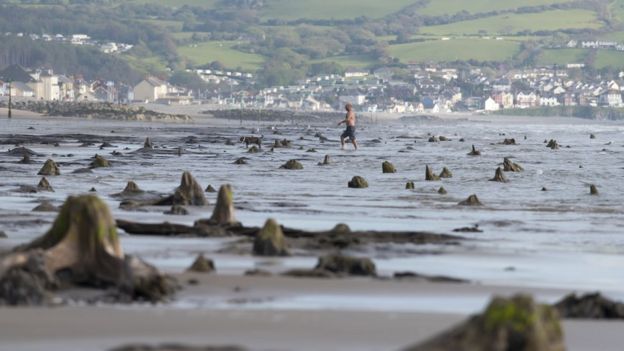By Paul Homewood
Today’s silly story comes from the BBC (where else?)
More ancient monuments and historic ruins will be uncovered as extreme weather caused by climate change gets more frequent, an expert has said.
The remains of a shipwreck off the Abergele coast dating back 150 years was revealed by July’s thunderstorms.
A prehistoric forest and 200 archaeological siteswere also unearthed following extreme weather.
Archaeologist Dr Paul Belford said “you’ll see more and more of this” as the world warms up.
Experts have “tentatively identified” the recently-uncovered Abergele wreck as the 35-tonne wooden sloop Endeavour that sunk without trace in gales in October 1854.
The remains of the 45ft long vessel was found at Pensarn beach in Conwy county by a member of the public.
“The stormy weather created giant waves which moved the sand banks and exposed the boat,” said Dr Belford, chief executive of the Clwyd-Powys Archaeological Trust.
“You’ll see more and more wrecks and ancient monuments uncovered as extreme weather events become more frequent due to the impact of climate change.
“Like the recent shipwreck find, these discoveries can help us answer the questions of our history.
“Hopefully research will also help us learn lessons from the past and aid the fight against climate change.”
The north Wales shipwreck lies in the area known as Abergele Roads, a large area of shoals, near a tidal pond, which is only visible after storms and during low tides.
It comes after a forest buried under water and sand for more than 4,500 years was uncovered between Ynyslas and Borth in Ceredigion by Storm Hannah in May.
The remains of the trees, preserved in the local peat, were exposed by low tides and high winds.
https://www.bbc.co.uk/news/uk-wales-49413435
They obviously don’t appreciate the irony of discovering a ship that sank in “extreme weather” in 1854!
And as sea levels are supposedly rising so fast, such wrecks should be unlikely to be found in future.
But what about extreme weather becoming more frequent? The claim comes from an archaeologist, who we can safely assume knows bugger all about the climate.
Proper meteorologists would have told him that the opposite is true. As the world warms, the differential between polar cold and tropical heat should reduce (as the poles warm faster), thus reducing the intensity of storms in the Temperate Zone.
Maybe our archaeologist friend should have read HH Lamb!



HH Lamb: Climate, History and the Modern World





